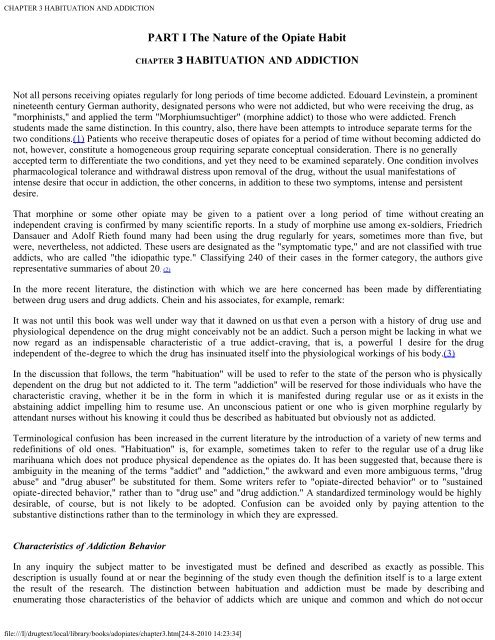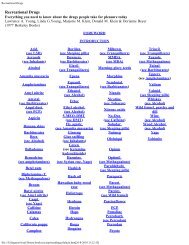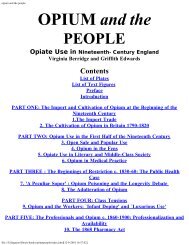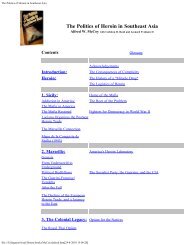Addiction and Opiates
Addiction and Opiates
Addiction and Opiates
Create successful ePaper yourself
Turn your PDF publications into a flip-book with our unique Google optimized e-Paper software.
CHAPTER 3 HABITUATION AND ADDICTION<br />
file:///I|/drugtext/local/library/books/adopiates/chapter3.htm[24-8-2010 14:23:34]<br />
PART I The Nature of the Opiate Habit<br />
CHAPTER 3 HABITUATION AND ADDICTION<br />
Not all persons receiving opiates regularly for long periods of time become addicted. Edouard Levinstein, a prominent<br />
nineteenth century German authority, designated persons who were not addicted, but who were receiving the drug, as<br />
"morphinists," <strong>and</strong> applied the term "Morphiumsuchtiger" (morphine addict) to those who were addicted. French<br />
students made the same distinction. In this country, also, there have been attempts to introduce separate terms for the<br />
two conditions.(1) Patients who receive therapeutic doses of opiates for a period of time without becoming addicted do<br />
not, however, constitute a homogeneous group requiring separate conceptual consideration. There is no generally<br />
accepted term to differentiate the two conditions, <strong>and</strong> yet they need to be examined separately. One condition involves<br />
pharmacological tolerance <strong>and</strong> withdrawal distress upon removal of the drug, without the usual manifestations of<br />
intense desire that occur in addiction, the other concerns, in addition to these two symptoms, intense <strong>and</strong> persistent<br />
desire.<br />
That morphine or some other opiate may be given to a patient over a long period of time without creating an<br />
independent craving is confirmed by many scientific reports. In a study of morphine use among ex-soldiers, Friedrich<br />
Dansauer <strong>and</strong> Adolf Rieth found many had been using the drug regularly for years, sometimes more than five, but<br />
were, nevertheless, not addicted. These users are designated as the "symptomatic type," <strong>and</strong> are not classified with true<br />
addicts, who are called "the idiopathic type." Classifying 240 of their cases in the former category, the authors give<br />
representative summaries of about 20. (2)<br />
In the more recent literature, the distinction with which we are here concerned has been made by differentiating<br />
between drug users <strong>and</strong> drug addicts. Chein <strong>and</strong> his associates, for example, remark:<br />
It was not until this book was well under way that it dawned on us that even a person with a history of drug use <strong>and</strong><br />
physiological dependence on the drug might conceivably not be an addict. Such a person might be lacking in what we<br />
now regard as an indispensable characteristic of a true addict-craving, that is, a powerful 1 desire for the drug<br />
independent of the-degree to which the drug has insinuated itself into the physiological workings of his body.(3)<br />
In the discussion that follows, the term "habituation" will be used to refer to the state of the person who is physically<br />
dependent on the drug but not addicted to it. The term "addiction" will be reserved for those individuals who have the<br />
characteristic craving, whether it be in the form in which it is manifested during regular use or as it exists in the<br />
abstaining addict impelling him to resume use. An unconscious patient or one who is given morphine regularly by<br />
attendant nurses without his knowing it could thus be described as habituated but obviously not as addicted.<br />
Terminological confusion has been increased in the current literature by the introduction of a variety of new terms <strong>and</strong><br />
redefinitions of old ones. "Habituation" is, for example, sometimes taken to refer to the regular use of a drug like<br />
marihuana which does not produce physical dependence as the opiates do. It has been suggested that, because there is<br />
ambiguity in the meaning of the terms "addict" <strong>and</strong> "addiction," the awkward <strong>and</strong> even more ambiguous terms, "drug<br />
abuse" <strong>and</strong> "drug abuser" be substituted for them. Some writers refer to "opiate-directed behavior" or to "sustained<br />
opiate-directed behavior," rather than to "drug use" <strong>and</strong> "drug addiction." A st<strong>and</strong>ardized terminology would be highly<br />
desirable, of course, but is not likely to be adopted. Confusion can be avoided only by paying attention to the<br />
substantive distinctions rather than to the terminology in which they are expressed.<br />
Characteristics of <strong>Addiction</strong> Behavior<br />
In any inquiry the subject matter to be investigated must be defined <strong>and</strong> described as exactly as possible. This<br />
description is usually found at or near the beginning of the study even though the definition itself is to a large extent<br />
the result of the research. The distinction between habituation <strong>and</strong> addiction must be made by describing <strong>and</strong><br />
enumerating those characteristics of the behavior of addicts which are unique <strong>and</strong> common <strong>and</strong> which do not occur





